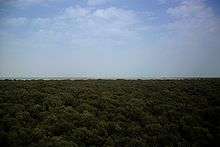Flora of Qatar
.jpg)

%2C_view_of_the_village.jpg)
The flora of Qatar includes more than 300 species of wild plants.[1]
Vegetation is extremely sparse in the hamada landscape due to the heavily weathered soil. A native species of tree, Vachellia tortilis (known locally as samr)[2] is well adapted to the desert environment and one of the most common forms of vegetation in the country.[3] Zygophyllum qatarense and lycium shawii also grow in this landscape.[3]
Shallow depressions referred to as rodat constitute a more varied selection of plants since rainwater run-off is more likely to accumulate. Ziziphus nummularia favors deeper soil in this type of habitat, whereas the grass cymbopogon parkeri is found in shallower soils. In the south of the peninsula, panicum turgidum and vachellia tortilis grow in the wind-blown soils.[3]
Natural areas
Natural areas in Qatar include:
- Al Shahaniyah Park in Al-Shahaniya
- Al Wabra Wildlife Preservation
- Khor Al Udeid Fish Sanctuary
- Al Reem Biosphere Preserve (designated in 2007) is part of the World Network of Biosphere Reserves in the Arab States
- Ras Ushairij Gazelle Conservation Park
- Al Thakira Nature Reserve in Al Thakhira[4]
- Khor Al Adaid in Khor Al Adaid[4]
- Ras Abrouq Nature Reserve (also known as Bir Zekreet (Zekreet Beach) in Ras Abrouq[4]
- Umm Tais National Park[4]
Taxonomy
Class: Psilotopsida
Order: Ophioglossales
- Family: Ophioglossaceae
- Genus: Ophioglossum
- Ophioglossum polyphyllum (native)
- Genus: Ophioglossum
Class: Magnoliopsida
Order: Caryophyllales
- Family: Caryophyllaceae
- Genus: Silene
- Silene Arabica (native)
- Genus: Silene
- Family: Polygonaceae
- Genus: Calligonum
- Calligonum comosum (native)
- Genus: Calligonum
Order: Malpighiales
- Family: Euphorbiaceae
- Genus: Mercurialis
- Mercurialis annua (introduced)
- Genus: Mercurialis
Order: Fabales
- Family: Fabaceae
- Genus: Taverniera
- Taverniera spartea (native)
- Genus: Senna
- Senna occidentalis (introduced)
- Genus: Taverniera